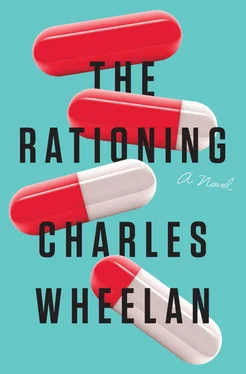I held her hand as we wound our way through a narrow wooded path that led to her building. When we reached the front door she turned and wrapped her arms around my neck. We kissed—not the platonic pecks that we had exchanged a hundred times over the years—but a deep lingering kiss. Her mouth tasted of beer and spearmint gum, which I remember her popping in as we left the picnic. The moment was wonderful, and we had done something that we had never done before, but I recognize now that it was not particularly passionate, at least not on Sloan’s part. After the long kiss, during which my hands roamed up and down like some kind of time-sensitive geological survey, Sloan pulled back and gave me a peck on the forehead, a much more familiar gesture. “Good night,” she said. “This was wonderful. Perfect.” She did not invite me in.
Sloan’s career plan was uncanny, because it unfolded pretty much as she described that night. She spent two years writing and traveling (deferring Harvard for a second time) while building up a portfolio of work. She ground her way through Harvard Law while working summers in the newsroom at the New York Times . Between her second and third years, she was the personal assistant to Barack Obama, helping to draft his columns. Sloan’s postgraduation job search worked out exactly as she had planned: she was a Harvard Law grad applying for prestigious journalism jobs, setting her apart from other aspiring writers. Meanwhile, her super-smart law school classmates were slashing each other’s eyes out competing for clerkships and positions at prestigious law firms.
Sloan was clever. She was also ambitious, in the old Shakespearean pejorative sense of the word, which I did not fully appreciate until I became a victim of that ambition.
WE RECONVENED AFTER LUNCH IN THE CABINET ROOM, BUT the meeting broke up almost immediately, before the President had even taken his seat. The Communications Director, tethered as always to his phone, said, “Hold on, can we have five minutes here?” He huddled in the corner with the President, the Chief of Staff, and the Strategist. Something had obviously broken in the news. I did a quick search on my phone. The top story was that teen pop star Onyx was reportedly pregnant. Obviously that was not delaying our meeting—but I clicked anyway. “Hollywood sources” were saying that Ryan Seacrest, who had to be nearly sixty, might be the father. I restrained myself from clicking on that, too.
I scrolled down. There was a study purporting to show that one donut a day could lower your blood pressure. That was not why the President was huddled in the corner, either. I scrolled further. The script for an Oscar-nominated film was allegedly plagiarized. Two convicts had escaped from a New York state prison, one of them for the second time. (According to a poll on the subject—who conducts polls about prison breaks?—a solid majority of Americans were pulling for the escapees.) And then, near the bottom of the page: “News Outlet Reports Nuclear Standoff.” Some Middle East news agency that I had never heard of, perhaps because it was really just some Arab guy sitting in his underwear in his parents’ basement, was reporting that Saudi Arabia had threatened “nuclear retaliation against the state sponsors of the recent coup attempt.” The story hinted that Iran was behind the coup and that the Saudis had Tehran in their nuclear crosshairs. Even I knew that made no sense. The Iranians are Shia Muslims; the coup plotters were radical Sunnis. Besides, the President had been with us since our morning delay, so my sense was that that situation was under control. I clicked around. Other news outlets had picked up the story from the Middle East Affairs News Outlet. All of the coverage mentioned that the President had been sequestered in the White House for days with the Secretary of Defense, the Speaker of the House, and the Senate Majority Leader. They did get that right. A cub reporter on a high school newspaper could tell that something was afoot, even if it did not happen to be a nuclear standoff in the Middle East.
I was amazed by the speed with which the cameras were set up on the White House lawn. Each major news outlet gave the crisis a name, because every disaster of any sort must now have a name. Fox News tossed subtlety aside and went with “Countdown to Armageddon.” NBC went with “Nuclear Nightmare?,” which deserves honorable mention for inviting panic while simultaneously adding the question mark to signal they really had no clue what was happening. The nuclear story was taking on a life of its own, crowding out nearly everything else on the political page (though Onyx’s alleged pregnancy was still a far more popular story overall). Another story at the bottom of the Netflix politics blog caught my eye. The Speaker of the House had told a group of political reporters that the U.S. approach to China “may be overly confrontational.” I was still a political neophyte, but even I could see her long game on this one. China had the Dormigen; the Speaker was going to be the one to get it.
The President, the Chief of Staff, and the others had wandered back to the table in the Cabinet Room, still discussing the nuclear situation. “It buys us time,” the Communications Director was arguing.
“Great,” the President said sarcastically. “It might also set off a real nuclear conflict. The last thing we need is a bunch of unstable regimes believing that the Saudis and the Israelis are conspiring to launch an attack.”
“No government is going to take this seriously,” the Communications Director said.
“The hell they won’t,” the President snapped. “Have you spent any time in the region? Have you? The place runs on conspiracy theories, not to mention that there are twenty different groups that will use this to advance their agenda, whether they think it’s true or not. This story needs to die now .”
“Then how do we explain it?” the Communications Director said, motioning to the rest of us standing and sitting around the conference table.
“That’s your job,” the President said unhelpfully. The Chief of Staff called the meeting back to order, but no more than three minutes later the Communications Director interrupted, “Sorry, can I have five minutes alone with the President?”
“You just had twenty,” the President said. “Unless you can get me a million doses of Dormigen, we need to be right here.”
“I agree with the President,” the Speaker of the House said. “We still don’t have a grasp on what’s happening here.”
“Give me five minutes,” the Communications Director insisted. “I can kill this nuclear story right now. Can we talk with the First Lady?”
“What does she have to do with this?” the President asked, genuinely puzzled.
“Five minutes, everybody. Sorry,” the Communications Director said.
I was not privy to the subsequent meeting. I admire the First Lady for her willingness to play a role in a very clever misdirection scheme. Then again, no one ever doubted the First Lady’s toughness. The Communication Director’s plan can best be described as media tai chi. “You cannot fight a story, no matter how ridiculous it is,” he told me later. “You can only redirect the frenzy.” Buried in the news that day was another story—made up wholesale by some Internet troll—that the President was having an affair with a South American diplomat. The story had no legs whatsoever. The page had ninety-one views when the Communications Director stumbled across it. It was wedged between a headline proclaiming that a cream made from avocado pits could cure skin cancer and another alleging that the former Federal Reserve Chair had stolen two tons of gold during his tenure—purloining bars one at a time from the vault under the New York Federal Reserve Bank, hiding them under his desk (which was in Washington??), and eventually sneaking it all out in the family minivan.
Читать дальше












